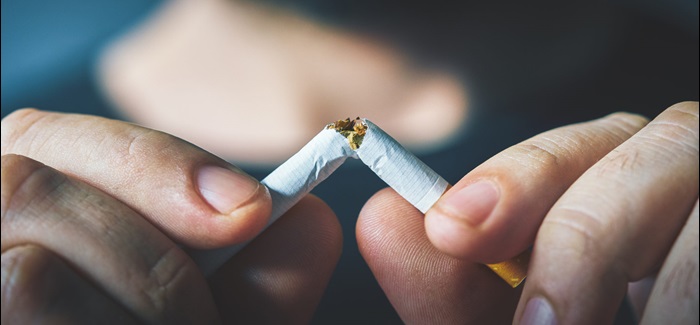Quitting Smoking is Key – Here’s How to Do It

January 06, 2021
Quitting smoking is one of the most effective ways to improve your health. If you have already quit smoking, congratulations! If you’re still struggling with quitting, there has never been a better time to kick the habit for good.
We also understand how challenging the year 2020 has been. You may be feeling stressed because of the COVID-19 pandemic and other events, and you may be tempted to pick up a cigarette again. If you’re thinking, “I’m only going to smoke this one cigarette,” pause from a moment. There are plenty of ways to relieve your stress without taking up the habit you worked so hard to break.
How to Quit Smoking
Quitting smoking is hard. The writer Mark Twain is widely credited as saying, “Giving up smoking is the easiest thing in the world. I know because I’ve done it thousands of times.”
“It’s incredibly difficult to quit,” noted Martin Gutierrez, M.D., chief of the Thoracic Oncology Division at Hackensack Meridian John Theurer Cancer Center. “Smoking is very addictive.” If you haven’t quit smoking yet but you’d like to, talk with your health care provider about some ways that might work for you to stop smoking. Many people have successfully quit with the help of the following tactics:
- Counseling to help you make a plan to quit smoking and identify the best ways for you to cope with stress and urges to smoke.
- Medications that help you manage withdrawal symptoms and cravings so you can remain confident and maintain your motivation to quit. Examples include bupropion and varenicline.
- Nicotine replacement therapies, such as patches, gums, lozenges, nasal sprays, and inhalers.
- Smoking cessation classes, where you derive support not only from the guidance of the class leader but others in the class who, like you, want to quit smoking.
Why Quitting Smoking Is So Important
Smoking raises your risk of lung cancer and other cancers, heart disease, stroke, peripheral vascular disease, and chronic obstructive lung diseases such as emphysema, among many other illnesses. It can also make it much harder to fight COVID-19 if you become infected.
When you quit smoking, your risk of these diseases and complications declines. You also protect your family members, coworkers, friends, and others from the health risks associated with breathing secondhand smoke.
The benefits of stopping smoking begin almost immediately. Within minutes, your heart rate begins to slow down. Your blood carbon monoxide level declines to that of a nonsmoker within days. Your coughing and shortness of breath start to get better in 1-12 months. And over the years to follow, your risks of a heart attack, various cancers, and stroke gradually decline — approaching that of a nonsmoker by the 20-year mark.
Take a Deep Breath
If you’ve already quit smoking and you resume the habit, it can be hard to stop. “One cigarette becomes two, and then four, and then it might not be long before you’re back up to what you were smoking before you quit,” said Thomas Bauer, M.D., chief of Thoracic Surgery at Hackensack Meridian Jersey Shore University Medical Center. There are other things you can do to manage your stress that don’t involve tobacco. Here are some tips on how to manage your stress while still kicking the habit:
- Take a deep breath. Meditation and deep breathing are excellent ways to ease stress and feel more emotionally and mentally centered.
- Go for a walk. Get outside and stroll around your neighborhood or on a hiking trail — making sure to maintain social distancing and wearing a mask if you cannot.
- Listen to music or watch a performing arts event online. There are many to choose from. You can even take online tours of famous museums around the world.
- Start a new hobby, such as learning a new craft or taking up a musical instrument.
- Identify what is causing you to feel stressed and reduce your exposure to it as much as you can — such as watching or reading the news less or minimizing exposure to people who may make you upset.
- Make sure you get a solid night of restorative sleep every night. Consider a short daytime nap if you are feeling anxious and have 20 minutes to spare.
- Avoid places and situations where you used to smoke.
- Connect with family members and friends. Reach out via phone or video chat, or take a walk together outside. Making emotional connections with others we enjoy spending time with is an excellent way to reduce anxiety.
- Consider mind-body therapies such as acupuncture, aromatherapy, massage therapy, yoga, and t’ai chi, which can relieve your stress and help you feel more centered.
- Focus on what you can control instead of expending energy on what is beyond your control.
The material provided through HealthU is intended to be used as general information only and should not replace the advice of your physician. Always consult your physician for individual care.






